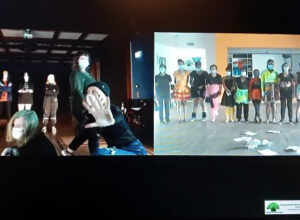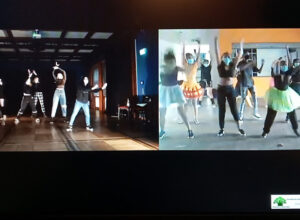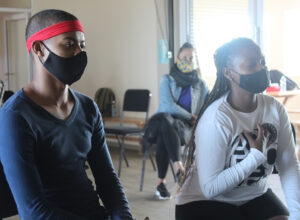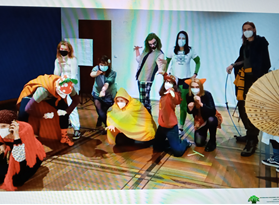Ubuntu Youth Exchange (UYE) Programme

1. Introduction
The Ubuntu youth exchange programme of the Institute is now in its fifth year of operation and has been the result of a six years partnership with Jugendkulturarbeit e.V. Oldenburg (Youth Cultural Work Oldenburg (JKA) and its network.
The Southern Africa Development, Research and Training Institute (SADRAT Institute) in South Africa (SA) and Jugendkulturarbeit e.V. Oldenburg (Youth Cultural Work Oldenburg (JKA) in Germany entered into a partnership agreement with the joint vision of enhancing cultural development, stimulating critical consciousness of opinions, perspectives and behaviours, positive youth development and strengthening civil society in both countries.
2. Background
The collaboration between Sadrat Institute and JKA started in 2010 through the network of the Nelson Mandela University Faculty of Education and its partner, the Centre of Educational Studies linking North and South, at Carl von Ossietzky University Oldenburg in Germany. Discussion and exchange of ideas culminated in an invitation from JKA to visit its project and programmes in 2014. Nelson Mandela University (NMU) Head of Arts, Culture and Heritage, Michael Barry and Managing Director, Gerhard Lück of the Sadrat Institute visited Oldenburg from 10 – 22 November 2014 and forged a working agreement during this visit.
Every year fifteen South African youth are selected from projects with which The Institute has closely collaborated. These are The School @ Home Winterschool Project in the Northern Areas; the Bay Creative Writing Development Project (BCWDP), the Performing Arts School of the Northern Areas People Development Initiative (NAPDI) and students each from the Arts, Culture and Heritage Department and Department of Social Development Professions at Nelson Mandela University and recently also the Wilderness Foundation Africa.
The youth exchange programme aimed to be a catalyst for the youth’s transcendence to global citizenship. The exchange allows two groups of 15 youth from Germany (Oldenburg) and South Africa (Nelson Mandela Bay) respectively, to embark on a journey that promotes their interdependence and appreciation for humanity. Furthermore, being afforded the opportunity to travel to and live in another country more than 9000 kms from their home, expands their worldview, and ignites their awareness of the global space. It is anticipated that the multicultural exchange of knowledge and skills through experiential engagements would accelerate the youth’s commitment to global citizenship. The youth exchange created the opportunities for growth and development (through economic and social entrepreneurship) as opposed to being dependent on state resources and formalised employment opportunities.
The programme is in alignment with several of the United Nation’s Global Sustainable developmental goals, but particularly, the support of global citizenship. Similarly, it accords with the goal underpinning South Africa’s National Development Plan (South Africa, 2011) to identify and implement mechanisms and interventions that will act as catalysts for young people to reach their full potential
All the above background of the collaboration agreement forms the foundation of the UYE programme and together with the integration of the Alternatives to Violence Programme (AVP) provided a sound methodology to conduct a complex exchange with so many different dynamics.
3. Approach to Youth Cultural Development
The partnership is based on a common understanding of the impact of migration and sustainable development approaches on youth cultural development.
3.1 Migration
Migration has become a global issue and includes Germany and South Africa. Questions of migration and its effect on Germany and SA, and how this then relates to the partnership, need ongoing discussion.
Migration in Germany is linked to the strong economy and quality education which attracts people from all over the world. Germany also takes in many political asylum seekers/refugees from around the world. This has contributed, over the last few decades, to a diverse population profile. South Africa, regarded as the powerhouse of Africa, has always had a very diverse society through its unique history. In addition, many Africans come to SA to seek work and to improve their education. These commonalities invite much research and a solution orientated thinking to facilitate social cohesion in both societies. The partnership creates an interesting space to share and test programmes for the youth in particular so that they could connect with each other and contribute to build a strong future society in terms of democracy, human rights and respect for diversity in both countries.
As noted before, both countries are uniquely positioned with a society of many differences and complexities and its own history and heritage (e.g. legacy of apartheid and the German Holocaust.) This partnership could serve as model for many other countries to learn new ways of engagements so that communities benefit more from each other by working closer together, sharing more and subsequently understanding and appreciating more of “the other culture”.
3.2 Culture and Art for Sustainable Development
Cultural development is an integral part of political development and development of the self. It also fosters understanding of difference. This collaboration enhances these as it draws on experiences of two countries. Sustainable development is development that meets present needs and the ability of future generations to meet their own needs. Sustainable development forms part of an integrated approach to Arts and Culture development
“Artistic development, cultural education, differences and identity are important components of sustainable development. They are the foundation of a future orientated way of life. This is underlined by the declarations of the United Nations as well as by discussions around cultural education in which it is continually stressed that, as well as purely cognitive learning, the achievement of key qualifications is also necessary for an active creative and innovative society. Social and cultural development is closely connected to economic and political development. By encountering international art, through intercultural cooperation, exchange and through the debate around the world view of other cultures, interests in and openness to other ways of life and their distinct qualities result. The chance to include others in a common global responsibility grows, if one can discuss different ways of life and different models of progress and development. This is the basis for development co-operation that considers culture to be an organising strength and which supports cultural liberty. Culture and art promote creativity and the activity of civil society which is so vital in the present South Africa. The counter stagnation and favour lasting change. They strengthen communication between humans, internationally, nationally and regionally. Thus they support an open and the same time critical consciousness of opinions, perspectives and behaviours”. [Hoffman, Handwerg and Krause,2006, p83 ]
The above quote underscores the rationale and the activities of the exchange through the South Africa and German partnership. The play is an output that draws on the above understandings of culture and art for sustainable development by considering what it means to be a global citizen and a responsible consumer.
4. International Youth exchanges since 2017
4.1 12-28 April 2017 Oldenburg/Germany
The mediums used to facilitate youth development are dance, drama, life skills and training in non-violent communication.
15 young people from each country have embarked a creative process to produce an inspiring play with the theme of “Ubuntu” (Ubuntu = I am because you are) in 12 days. The play focused on gender inequalities, humanity and community in both countries. Differences between different cultures and within communities are displayed on stage with dance and drama to bring across the important message of gender equality and tolerance in the broader context of “Let´s make Ubuntu”.
The project is supported through the Federal Ministry for economic cooperation and development, Lower Saxony Ministry for science and culture, Lutheran Development Service, weltwärts, DGB Jugend, Brot für die Welt.
4.2 South Africa 2018
18 March – 4 April 2018 Port Elizabeth / South Africa

4.3 12 – 29 April 2019 Oldenburg / Germany
On 12 April 2019 the 15 young South Africans (from previously disadvantaged communities) arrived for the youth exchange programme in Oldenburg, Germany. This was the second cycle of Youth Exchange Programme after a successful start of the programme in 2017/2018. They met up with their counterparts in Oldenburg (15 young Germans from diverse social backgrounds). Jointly they conceptualized, scripted and performed a play around issues of humanity, economy, community and global citizenship with a specific focus on gender and gender inequality this year. This play was been successfully staged twice on the 26 and 27 April at the JKA Theater hall in front of packed audience comprising parents, teachers and ex principal from the Northern Areas in Port Elizabeth who lives now in Oldenburg. The exchange seeks to foster critical consciousness and building of resilience among youth.


4.4 27 March – 15 April 2020 Soweto and Port Elizabeth / South Africa postponed and transformed into a digital exchange in April 2021
4.5 5 – 11 April 2021 digital exchange between the youth group in Port Elizabeth/South Africa and the youth group from JKA in Oldenburg/Germany
Due to COVID-19 we held a shortened and digital exchange with our German partners to conclude the second cycle of the exchange








